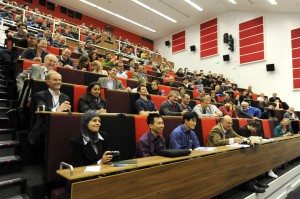SU demands more contact hours
 Warwick Students’ Union (SU) is rallying the University to set a minimum number of contact hours for every course, as part of a call for a shift towards teaching over research.
Warwick Students’ Union (SU) is rallying the University to set a minimum number of contact hours for every course, as part of a call for a shift towards teaching over research.
SU Education Officer Sean Ruston, said: “We believe basic standards should be called for. A minimum of eight hours per week would be a start, but twelve should eventually become the basic standard.”
Ruston branded the Arts and Social Sciences Faculties “the worst offenders” with many students receiving just six contact hours per week.
Both the Academic Quality and Standards Committee (AQSC) and the National Student Survey (NSS) outlined the same departments as having issues with contact time, including English and History.
However, the suggestion of a university-wide minimum has received strong opposition from the University and individual departments.
Asked whether the University should have a standard number of contact hours, Head of Communications Peter Dunn said: “It will vary from faculty to faculty and department to department depending on the style of teaching within each discipline.”
Head of English Catherine Bates said, “The SU quantifies rather than qualifies contact hours. What we need to ask is ‘is it a quality hour?’”
Peter Marshall of the History Department agreed: “Valuable contact time and access to staff is at the heart of the student experience and we want it to remain there.
“There is no correlation between quantity and quality – it has to be a balanced package.”
In response, Ruston said the SU are not suggesting quantity means better quality, but rather the departments should be able to do both. In order to progress, students need more quality hours.
Other departments with fewer contact hours include Classics, History of Art, Psychology, Comparative American Studies and Politics.
Holly Moorhouse, first-year Classical Archaeology and Ancient History student, believes Arts students do not have enough contact hours: “We pay £3,300 a year for only nine to ten hours, and the lectures don’t get to go into much depth. The science students get a lot more time including smaller tutorials and so it doesn’t really seem fair.”
Not all students agree with the SU. Amy Collins, second-year English and Latin Literature student said: “For English, the contact hours are just right. Any more would be too much. For Latin, if anything we have too much.”
There is also concern that the University is focusing too much on research rather than teaching.
“Research is where the money comes from,” said Ruston. “The University is ranked on research income. Every academic is assessed and the best universities come higher in the league tables and therefore the most prestigious. Thus they attract better academics, gain better research and so on.”
Ruston suggested this leads to a conflict between research and teaching, as the best way for academics to progress in their careers is through improved research rather than teaching.
Whilst the University supports research-led teaching, Ruston said it is “silly” to suggest there is a correlation.
“A good researcher does not make a good teacher. The University needs to stop assuming there is a link.”
Third-year History and Politics student Jo Ward said, “This actually worries me quite a lot – obviously research is an important part of the University, but so is teaching. Ultimately, if research affects league table rankings, it will take priority.
“I have had experience of a tutor who was first and foremost a researcher and clearly had a set quota of hours to teach on the side, and it was very obvious.”
Marshall argued, however, that the balance is actually shifting towards teaching because of the increased fees: “It’s been a reminder that teaching is at the heart of what we do.
“Research does not mean we’re forgetting about teaching. It is much harder [for academics] to get appointed now – you have to perform well across a range of areas.”
Marshall added, “[The research ranking system] is a fact of life now and it’s not unreasonable for some regulation that public money is producing good research.
“Candidates in recent interviews for new academic staff in the History department are still being asked for teaching plans and module outlines.”
From September, all University courses have to submit a Key Information Set (KIS), accessible to prospective students when they are applying, including the number of contact hours, which makes the issue of teaching at the University all the more urgent, according to Ruston.
Comments